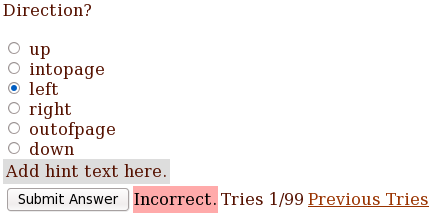The Lady and I watched Doubt last night, and I thought it was excellent. I don’t remember seeing a movie with Philip Seymour Hoffman that I didn’t think was excellent. If he starred in Spy Kids 4, I’d probably think it was great. That’s an exaggeration.
Hints
2009-07-22I was doing my online Physics homework, and when I got a problem wrong, the little gray box that sometimes pops up with a hint asked me to supply my own:

Comments
Lists
2009-07-22I’ve added a “lists” feature to the blog (linked at the top). It will allow me to have running lists of anything that I feel ought to be enumerated. Starting with topics I’m interested in learning about. There will be a list of good names for a rock band just as soon as I think of the first one.
Comments
Exploring the Prime Reciprocals
2009-07-17One of my favorite mathematical theorems that I've been exposed to so far is the divergence of the sum of the prime reciprocals (as referenced here and proven here). It says that if you take all the prime numbers (which are infinite) and turn them each upside down so that they're in the denominator of a fraction, and add up all those fractions, the resulting sum will be infinite. If this doesn't sound remarkable, let's try a few.
The first ten primes:
1/2 0.50000000000000000000 1/3 0.33333333333333333333 1/5 0.20000000000000000000 1/7 0.14285714285714285714 1/11 0.09090909090909090909 1/13 0.07692307692307692307 1/17 0.05882352941176470588 1/19 0.05263157894736842105 1/23 0.04347826086956521739 1/29 0.03448275862068965517 Total= 1.53343877187203202214
Not very big, but of course ten primes is not that many either. Let's try some more
The first 500 primes, 2 --> 3571
... ....... 1/3541 0.00028240609997175939 1/3547 0.00028192839018889202 1/3557 0.00028113578858588698 1/3559 0.00028097780275358246 1/3571 0.00028003360403248389 Total= 2.36532946588456968519
By adding 490 more primes, we increased our total sum from 1.533 to 2.365. Finally, if we add the reciprocals of the first million primes, the result is only 3.06821904805 (that's as far as my computer is interested in calculating). I doubt it would ever count high enough to get to 4. And yet, the theorem says that if the process continues indefinitely, the sum will get as high as you like.
I like it.
Comments
Goin' Swimmin'
2009-07-15Somebody stopped me downtown today to ask me for directions to the beach. I asked if they were referring to the beach at the ocean, and they said yes.
But the ocean is 115 miles from here.
Comments